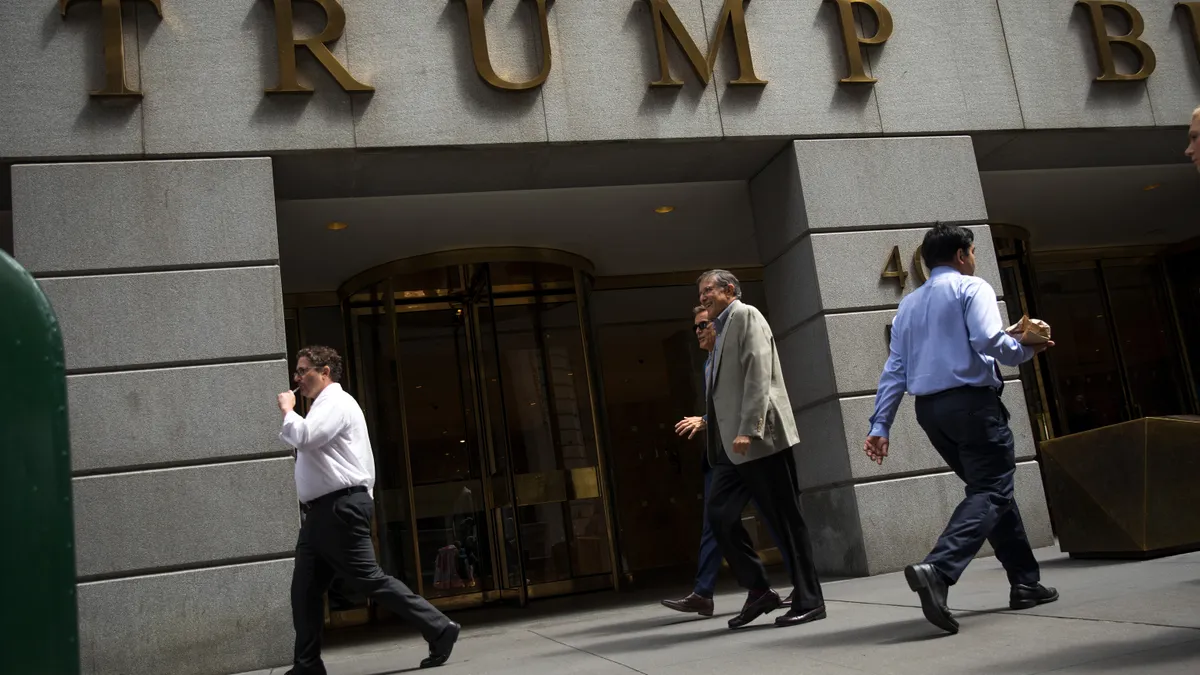As Manhattan district attorney Cyrus Vance, Jr., and New York Attorney General Letitia James deepen their probe into Donald Trump’s business and finances, pressure on longtime Trump Organization CFO Allen Weisselberg is reaching a fever pitch. The probe officially became a criminal tax inquiry late last month.
Weisselberg, Trump’s CFO and confidant of over 40 years, has been spotted entering and departing from Trump Tower numerous times in recent weeks, which the Washington Post suggests is a public signal of his loyalty to Trump and his resistance to investigators’ ongoing demand for cooperation.
Weisselberg is the most senior Trump Organization executive that’s not a member of the family. Since March, he has been a key figure in Manhattan District Attorney Cyrus Vance, Jr.’s investigation into Trump’s business and finances.
Over two years after Vance’s office opened the inquiry, it is reaching its end point: Vance is set to retire when his term ends in six months, and a grand jury has been convened to decide whether to indict Trump.
Former Trump employees have described Weisselberg as having been entrusted with nearly every aspect of Trump’s business and personal finances before, during and after his term in office.
“Just to say ‘He’s the money man’ actually underestimates his role,” Tristan Snell, who headed the New York attorney general’s fraud investigation of Trump University, told the Washington Post. “Weisselberg really ran the whole company.”
Weisselberg managed all of the organization’s subsidiaries while Trump focused on marketing, licensing and public-facing roles, including his TV career, Snell added.
Legal history
In his capacity as CFO, Weisselberg led finance for Trump’s charitable foundation, which shuttered following a New York Attorney General investigation in 2018, and managed spending for Trump University.
Most recently, Weisselberg signed checks to Trump’s former personal lawyer Michael Cohen, which Cohen says were reimbursements for hush money payments made to Stormy Daniels and others on Trump’s behalf.
In each of the prior legal battles involving the Trump family, including the current probe, neither Trump nor Weisselberg were charged with any wrongdoing.
Without Weisselberg’s cooperation, sources told the Washington Post, the prosecution may be unable to nab Trump on a basis of intent. But Weisselberg could potentially be hit with jail time too, should James’ and Vance’s teams prove he misrepresented the Trump Organization’s assets or income to banks, insurers or tax authorities.
“I think he’s playing Russian roulette with the district attorney’s office if he thinks that even if he is indicted he is going to get a pass,” Robert Gottlieb, a defense lawyer and former prosecutor for the district attorney told the Washington Post. “We’re not talking about fraud involving a few thousand dollars, we’re talking about allegations of a massive fraud involving millions of dollars over an extended period of time in which he was CFO.”
Insider perspective
During Trump's time in office, Weisselberg remained the organization’s CFO, and was the only non-family member to oversee his trust. Prosecutors subpoenaed Weisselberg’s bank records in April.
Since Trump has left public office, Weisselberg has officially managed the bulk of Trump’s properties. This year, Weisselberg was listed as an officer of all 40 of the Trump Organization’s Florida-based subsidiaries.
“He was in charge of everything,” a former employee told the Washington Post of Weisselberg.
In his 2017 book, former Trump campaign manager Corey Lewandowski said Weisselberg "knows of every dime that leaves the building."
According to a deposition from the 2015 lawsuit regarding Trump University, Weisselberg had a detailed view on spending that is unusual for a CFO; he insisted on signing all of the company’s checks himself.
“By signing checks, which I do for all of our entities, I get a good feel for what the company is doing on a day-to-day basis, as opposed to waiting to get reports months after the fact,” Weisselberg said in the deposition obtained by the New York Daily News, adding that he focused on all manner of expenditures, including individual employees’ bonuses and prices Trump subsidiaries paid for office supplies.
But when it came to Trump’s alleged mishandling of funds or dishonest business dealings, Weisselberg has claimed ignorance. When the New York attorney general’s office questioned him about whether a political gift made by Trump’s foundation in 2017 was hidden in its tax returns, Weisselberg said, “I wish I could answer.”
James’ office, in 2012, asked Weisselberg whether the Trump Organization paid income taxes after a lender forgave over $100 million of its loans, the Post reported. Lawyers for the organization said Weisselberg could confirm as much, but he later testified that he had “no firsthand knowledge,” “had not reviewed the relevant documents,” “could not identify any return on which the forgiveness was treated as income,” and relied “solely upon his recollection.” James’s office wrote in an August 2020 filing.
Possible repercussions
As Vance’s term nears the end and the investigation ramps up, Weisselberg’s unwillingness to cooperate may be limiting his options down the line, sources said.
“Typically in state court, in New York County if you’re charged with a financial crime and you’re a rich millionaire you’re not going to go to jail — it rarely happens,” criminal defense and civil rights lawyer Earl Ward told the Washington Post. “The difference here is that there’s a real target in this investigation and given who that target is, I’d be surprised if [Weisselberg] gets off scot free."















